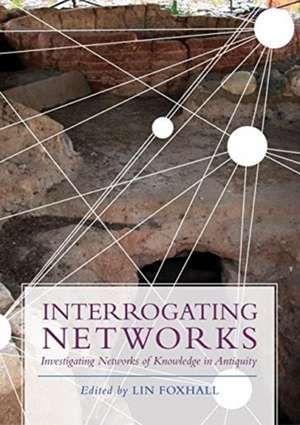Interrogating Networks
Editat de Lin Foxhallen Limba Engleză Paperback – 6 mai 2021
The chapters in this volume aim to interrogate the interpretative potential of network concepts for understanding the movement over time and space of ideas about how to make things through a range of archaeological case studies which reveal both functional and dysfunctional relationships. The purpose is to consider how more broadly contextualized and multi-faceted studies can both enhance, and be enhanced by, network and related approaches.
While there is much work on the use of formal, less formal and informal network theory, methodologies, including agent-based modelling, with the exception of Astrid van Oyen's work, far less thought has been devoted to the complexity of understanding the wider contexts and the full range of diverse factors which shaped the relationships which constitute networks. The volume will make a significant contribution to understanding the movement and transmission of knowledge (or in some cases their absence), and to debates about how best to expand the utility of network concepts and approaches.
This volume originated from an interdisciplinary Leverhulme Research Programme, 'Tracing Networks: craft traditions in the ancient Mediterranean and beyond'. This volume consists of a coherent selection of the archaeological papers which focus specifically on the interrogation of network concepts for understanding and interpreting the ancient past.
Preț: 129.06 lei
Nou
Puncte Express: 194
Preț estimativ în valută:
24.70€ • 25.69$ • 20.39£
24.70€ • 25.69$ • 20.39£
Carte disponibilă
Livrare economică 25 martie-08 aprilie
Livrare express 08-14 martie pentru 25.05 lei
Preluare comenzi: 021 569.72.76
Specificații
ISBN-13: 9781789256277
ISBN-10: 1789256275
Pagini: 144
Ilustrații: B/w
Dimensiuni: 239 x 171 x 12 mm
Greutate: 0.37 kg
Editura: OXBOW BOOKS
ISBN-10: 1789256275
Pagini: 144
Ilustrații: B/w
Dimensiuni: 239 x 171 x 12 mm
Greutate: 0.37 kg
Editura: OXBOW BOOKS
Descriere
This volume interrogates the interpretative potential of network concepts for understanding the movement of ideas over time and space through a range of archaeological case studies.
